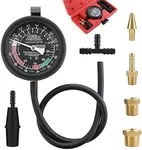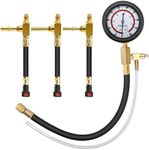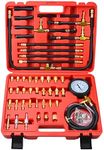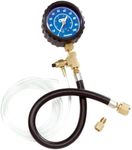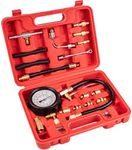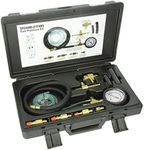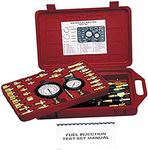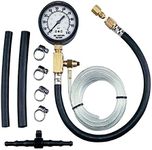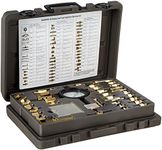Buying Guide for the Best Fuel Pressure Testers
Choosing the right fuel pressure tester is crucial for diagnosing and maintaining the health of your vehicle's fuel system. A fuel pressure tester helps you measure the pressure in the fuel system, ensuring that your engine is getting the right amount of fuel for optimal performance. When selecting a fuel pressure tester, consider the following key specifications to ensure you get the best fit for your needs.Pressure RangeThe pressure range indicates the range of fuel pressure that the tester can measure. This is important because different vehicles have different fuel pressure requirements. Typically, fuel pressure testers can measure pressures from 0 to 100 PSI. If you have a high-performance vehicle, you might need a tester that can measure higher pressures. For most standard vehicles, a tester with a range up to 100 PSI will suffice. Ensure the tester you choose covers the pressure range required by your vehicle's specifications.
Gauge AccuracyGauge accuracy refers to how precise the readings are on the fuel pressure tester. Accurate readings are essential for diagnosing issues correctly. Look for testers with high accuracy, often indicated by a small percentage error (e.g., ±1-2%). Higher accuracy gauges are better for detailed diagnostics, while lower accuracy may be sufficient for general checks. If you need precise measurements for performance tuning or troubleshooting, opt for a tester with higher accuracy.
CompatibilityCompatibility refers to whether the fuel pressure tester can be used with your specific vehicle make and model. Some testers come with a variety of adapters to fit different fuel systems, while others are designed for specific types of vehicles. Ensure the tester you choose has the necessary adapters or is compatible with your vehicle's fuel system. If you work on multiple vehicles, a tester with a wide range of adapters will be more versatile.
Build QualityBuild quality is about the durability and reliability of the fuel pressure tester. A well-built tester will last longer and provide consistent readings. Look for testers made from high-quality materials like stainless steel and brass, which are resistant to corrosion and wear. If you plan to use the tester frequently or in a professional setting, investing in a high-quality, durable tester is advisable.
Ease of UseEase of use refers to how user-friendly the fuel pressure tester is. Features like clear instructions, easy-to-read gauges, and quick-connect fittings can make the tester easier to use. If you're a beginner or prefer straightforward tools, look for testers that are designed with simplicity in mind. More advanced users might appreciate additional features like digital displays or more complex adapters.
Additional FeaturesAdditional features can enhance the functionality of a fuel pressure tester. Some testers come with extra accessories like hoses, adapters, and carrying cases. Others might have digital displays for easier reading or built-in safety features to prevent over-pressurization. Consider what additional features might be useful for your specific needs. If you need a comprehensive kit for various diagnostics, look for testers that offer these extras.

